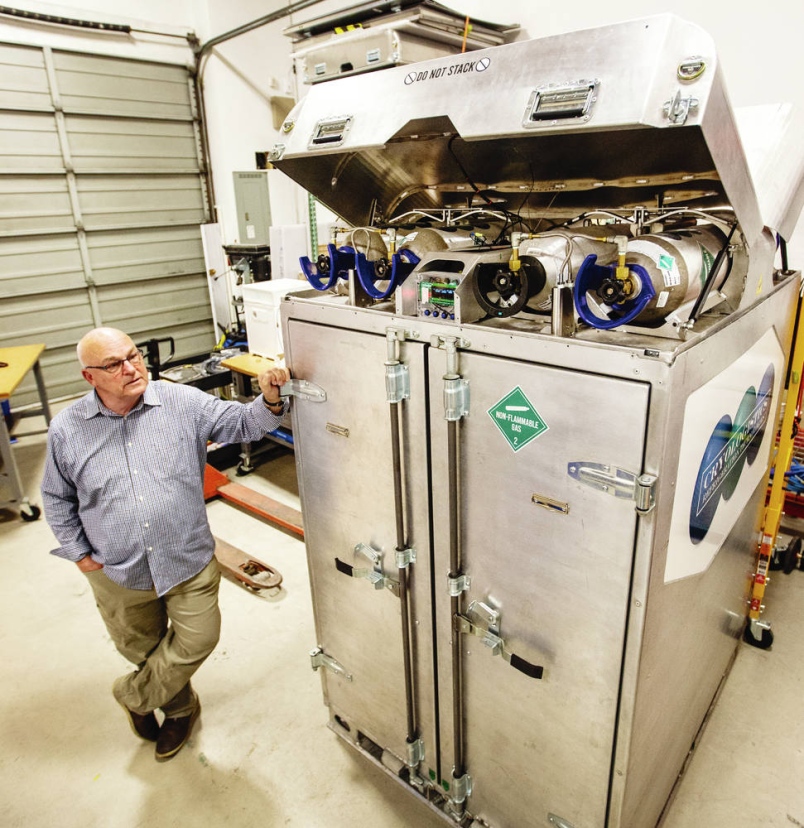COOL! VICTORIA FIRM COULD PLAY MOVING ROLE ON VACCINES
A Victoria clean-tech company is hoping to play a key role in the food and pharmaceutical supply chain — including the distribution of COVID-19 vaccines — as it starts production next month of its temperature-controlled shipping units.
CryoLogistics Refrigeration Technology Ltd. uses liquid carbon dioxide that’s pumped into insulated aluminum, vacuum-sealed containers to cool high-value and temperature-sensitive freight, such as seafood, produce and pharmaceuticals.
The company’s SnowSHIP containers allow for “pinpoint” temperature control throughout the supply chain and are considered more eco-friendly for shippers now relying on diesel fuel to power refrigeration trucks.
CryoLogistics CEO Peter Evans said the startup company has been running tests with several companies in Victoria and the Lower Mainland, collecting feedback to perfect its prototype units. It’s now ready to start production of 40 units at a Chilliwack manufacturing plant in October and November, with plans, guided by demand, to build about 20 units per month, said Evans.
Each unit sells for about $25,000. It’s a little larger than a household refrigerator, about four feet wide, five feet deep and seven feet high, and designed to align with standard pallet sizes and handling.
Evans predicts the CO2 technology will be a game-changer in the supply chain, allowing companies to cut emissions by running fewer “reefer” trucks or reducing the time they are in operation.
It’s also expected to reduce the massive amount of spoilage, said Evans, pointing to studies showing 30% of perishable food produced for human consumption spoils inside the supply chain and ends up in landfills, where it decomposes and generates significant greenhouse-gas emissions.
“The conventional diesel-powered transport refrigeration units now in use are fundamentally no different from those first introduced in the 1950s, each one generating up to three metric tonnes of emissions every year,” said Evans.
Evans said avoiding waste or spoiled goods is especially important to shippers of high-value products.
He said reefer loads are often exposed to temperature changes as truckers load and reload and shuffle pallets during deliveries. “Excessive movements exposes a product to temperature variations or contaminants. Confining a product in a secure system protects it.”
Evans said the system becomes even more important for critical pharmaceutical products, such as vaccines in the fight against COVID-19. “Pharmaceuticals have been part of our business case since Day 1 (in 2017),” said Evans. “And now it’s more important than ever.
“How does the world deliver billions of doses of vaccines?”
“Mixed loads” on a single reefer truck present challenges for shippers, said Evans. Some loads are frozen, some are chilled. Some products require a specific temperature.
The CryoLogistics units are designed to stay within one degree of programmed temperature, and the unit can be monitored continuously from a dashboard on a customer’s computer or cellphone.
“That’s uncommon in the industry,” said Evans.
ColdStar Solutions Inc., one of the region’s largest food-delivery companies, has been involved in testing the SnowSHIP containers for two years. It has provided feedback for design changes and sees the technology as an important part of its green-tech initiatives, said Kelly Hawes, CEO and founder of ColdStar.
“We believe this will be a tool for ColdStar and the transportation industry that will enhance Food Safe distribution to all market places,” he said.
CO2 is used in several industries, including food and beverage, manufacturing and the energy sector, for its natural refrigerant properties.
Evans said the idea to develop the CO2 technology in self-contained units came from his late father-in-law, Van Thomsen, a Canadian living in Seattle who was in the compressed-gas business.
“He gave this 20 years of his life. He was ahead of his time,” said Evans, who keeps a picture of Thomsen over this desk.
Evans was a career RCMP officer, who, after retirement, went on to work in commercial aviation, telecommunications and critical infrastructure protection. He started CryoLogistics in 2013.
Over the past two years, the privately held company has grown to 15 staff and raised more than $7 million from private investors and government research and development programs.
CryoLogistics got a big leg up with the the Fast Pilot Program funded by Innovate B.C. and the National Research Council of Canada. The company received advisory services and research and development funding that enabled potential customers to trial the SnowSHIP technology in their everyday operations.
Evans said the company has also employed 15 co-op students from the University of Victoria and Camosun College over the past 30 months. “It’s important for us to create opportunities for students to apply their skills in the city where they are learning, email to: dkloster@timescolonist.com
Peter Evans, CEO of Cryologistics Refrigeration Technology Ltd, with a temperature controlled shipping unit.

